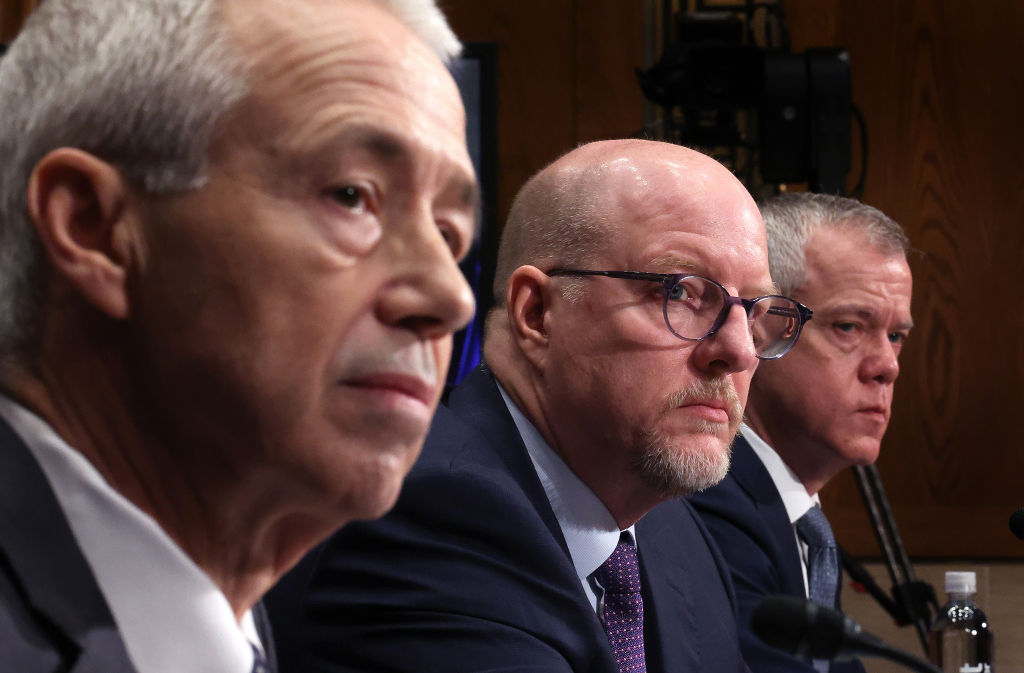Big Pharma Is About to Lose Billions on Expired Patents
Some of the biggest pharmaceutical firms in the US are nearing the end of multibillion-dollar patent windfalls as their exclusive rights to produce certain medications. The patent cliff could spark a massive wave of new drug manufacturing mergers.

Joaquin Duato, CEO of Johnson & Johnson, Robert Davis, CEO of Merck, and Chris Boerner, CEO of Bristol Myers Squibb, testify before the Senate Health, Education, Labor, and Pensions Committee at the Dirksen Senate Office Building on February 8, 2024, in Washington, DC. (Kevin Dietsch / Getty Images)
Some of the biggest pharmaceutical firms in the nation are nearing the end of multibillion-dollar patent windfalls as their exclusive rights to produce Americans’ lifesaving medications and vaccines expire.
The patent cliff could spark a massive wave of new drug manufacturing mergers, leaving innovation and research on the shelf in exchange for more industry consolidation and the expansion of already bloated pharma giants — to the delight of cash-hungry venture capitalists.
When patents expire, low-priced generics and biosimilars enter the market and drive drug prices down. According to Deloitte analysts, Big Pharma could see $236 billion in revenue disappear by 2030, as exclusive patents for 190 high-earning drugs developed in the early 2000s hit their expiration date — including sixty-nine “blockbuster” medications generating over $1 billion each annually.
Meanwhile profits from new drugs hitting the market are only expected to make up for about a third of those losses. The developments could result in a whopping 46 percent decline in US revenue for the world’s top ten pharma firms over the next decade.
PitchBook reports that instead of investing in researching and developing new pharmaceuticals, pharma giants faced with patent cliffs are increasingly buying up smaller firms and their new or pending drug patents.
Drugs included in the looming patent cliff include Merck’s cancer immunotherapy Keytruda, which made the firm just under $30 billion in sales last year. In 2028, Merck’s Keytruda patent will end, spooking investors and causing the firm to shed over 35 percent of its value in the last year.
But Merck has a solution: buy another firm and take over its newer, shinier patents.
The firm has announced its plans to acquire London-based Verona Pharma in a $10 billion deal that includes the new respiratory medication Ohtuvayre, approved by US regulators just over a year ago to treat chronic obstructive pulmonary disease. Analysts believe Ohtuvayre could generate upward of $4 billion in annual sales.
US biotech entities have seen their valuations drop and are trading at a “significant discount” from a year ago — meaning the patent cliff is a welcome development for up-and-coming drug manufacturers who are looking for corporate investors.
According to the Open Markets Institute, drug companies have turned to consolidation to avoid innovation and tend to cut research spending even further after mergers happen.
Under the Biden administration, regulators increasingly targeted anticompetitive pharma mergers and acquisitions, which they say hurt patients with “higher prices, less choice, and innovation.”
According to a 2025 Department of Health and Human Services report, drugs involved in pharmaceutical mergers were nearly 25 percent more likely to experience a shortage within two years of the acquisition.